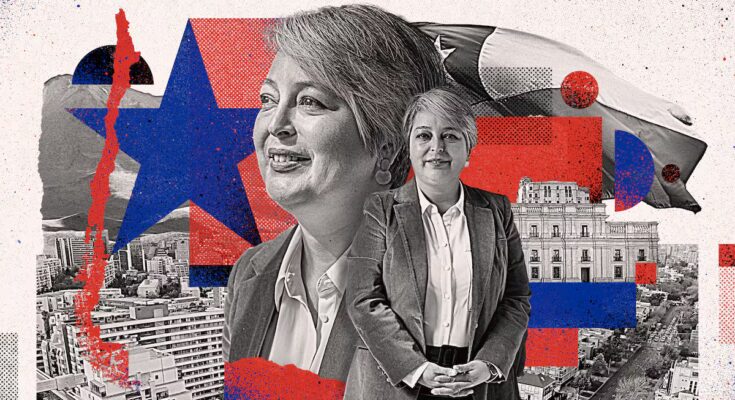Until the ban on the polls – Chilean law prohibits their disclosure in the 15 days before the elections – the presidential candidate of the most Christian-democratic left bloc, the communist militant Jeannette Jara (Santiago, 51 years old), had an average of 28% of the vote. The figure is almost similar to President Gabriel Boric’s almost incombustible support, which usually fluctuates between 28% and 30% (at worst it was 22% and at best 35%). But it is still far from the 38% of support that the left gave, in the September 2022 plebiscite, to the – failed – proposal for a new Constitution promoted by that sector.
According to the Pulso Ciudadano poll, carried out by Activa Research, presented a month before Sunday’s elections, 78.3% of Chileans who support Jara approve of the Boric government. And 62.6% of its adherents identify with the centre-left, while 22.7% define themselves as “without political position”.
The 51-year-old public administrator, lawyer and master in public management is first in the polls. But it is almost a given that it will pass to the second round and, most likely, it will be the Republican José Antonio Kast, of the radical and conservative right. Part of the ultras’ campaign is to negatively appeal to his ties to Boric, since he was his Labor Minister. “Jara is Boric and Boric is Jara. Nothing you say or do can change this. You are the successor of a failed government,” he said in front of his supporters at the closing of the election campaign at the Movistar Arena on Tuesday afternoon. Jara carried out the same activity, but in Plaza de Maipú: “Chile is not falling apart, it is a great country”, he emphasized to his supporters.
Jara led Boric’s Labor portfolio between March 2022 and April 2025: he resigned to begin his path to La Moneda. In that ministry he carried out initiatives that he presents today in his campaign and which benefit the most vulnerable Chileans. Among these, the historic increase in the minimum wage to 500 thousand Chilean pesos (just over 500 dollars) and pension reform. He also implemented the law reducing the working day to 40 hours per week.
Today Jara is aimed, in fact, at a large part of those Chileans: he proposes a public health reform, the expansion of universal nursery school and the right to decent housing. His program and his intervention are focused on those who get up at 6 every day and go to work by bus, he repeats. “We will ensure that every Chilean family can make ends meet in peace. This is my commitment, this is my seal. Dignity, decent work and good wages, that is why we will promote the living wage,” he said in Maipú on Tuesday.
A week ago, the candidate said on her social networks that she had asked her followers if they remembered her first salary. “Many answers were similar. There isn’t enough money and it’s difficult to make ends meet.” Then he reiterated his electoral promise: that the living income of workers should reach 750,000 pesos (about 795 dollars).
For this story, his personal history was fundamental and identifies those voters: he grew up in the locality of El Cortijo, in the municipality of Conchalí, north of Santiago. And along with his parents, a housewife and an auto mechanic, and his four brothers, he experienced periods of poverty. Even from relatives at a relative’s house. He recalled this on Tuesday, closing his electoral campaign: “I would never have imagined running for the Presidency of the Republic. Not because I thought I couldn’t do it, but because it is unusual for someone who comes from El Cortijo to open the doors of the Government Palace.”
But, like all candidates, his priorities include security, economic growth and the control of irregular immigration. “We don’t want hatred, we don’t want discrimination, we don’t want families’ legitimate fear of being attacked to be used as a campaign tool,” he said. And he added: “In my government there will be greater security in the neighborhoods” and also “a preventive approach,” he said. He also proposes the abolition of banking secrecy so that the Prosecutor’s Office follows the path of organized crime money.
The candidate has a great challenge ahead of her: looking for new support that will help her win the right-wing candidate with whom she will go to the run-off on December 14th. The context, however, is complex: the latest survey by the Center for Public Studies (CEP) shows that today 24% of Chileans identify with the right, the highest level in history; 36% with the center and 20% with the left.
These elections also present several peculiarities that make the scenario uncertain, especially for the left. This is, for example, the first presidential election to be held with compulsory voting and automatic registration, which implies that around five million new voters,
Furthermore, it is the first time since the return to democracy, in 1990, that the left faces three competitive rights: two radicals, that of Kast and that of the libertarian Johannes Kaiser, and another traditional one, with Evelyn Matthei. But there is another singularity. Although Jara is supported by nine parties, his communist militancy, a Marxist-Leninist community that believes in the dictatorship of the proletariat, has caused a political dilemma among parts of the moderate center-left. Most support it, but there is another who does not dare to take this step. This, despite his program supporting the values of the sector, such as “a just society” and support for individual freedoms: he said that, if he reaches La Moneda, he will support the causeless abortion project promoted by the Boric government.
Until Jara, the Communist Party (PC) had not achieved a competitive presidential option in 35 years. But, curiously, it is the PC that has given its all noise and made his candidacy uncomfortable at several points in the campaign. And this fact has also been part of the political dilemma of some Chileans, including Boric’s former finance minister, Mario Marcel. Even if he will give her his vote – “because I know her as a person and because I had to work with her” – he told this newspaper that he will do so “with one concern: the role of the PC in his possible government”. Another voice that reflects the situation is that of Ernesto Ottone, doctor in Political Science, center-left essayist and who was chief of advisors to the socialist president Ricardo Lagos, (2000-2006): “You cannot be communist and democratic.”
But Jara, beyond his ideology, was the one who provided the big surprise at the end of June, when he largely won the governing party’s primary elections and won with 60% over the social democrat Carolina Tohá. Today the Tohá sector supports him.
The candidate insisted that she represented a broad bloc and she did he has given signals to win over those centrist and non-ideological voters, which he will need above all in a possible run-off. And she announced that, if elected, she will leave militancy.


